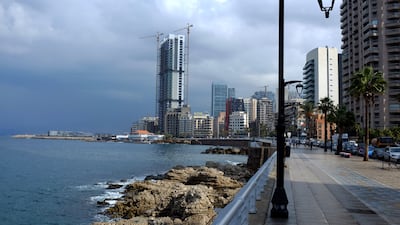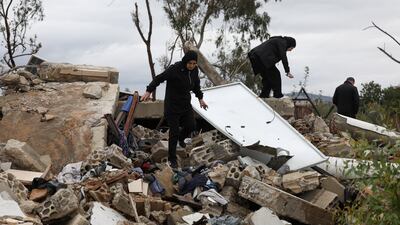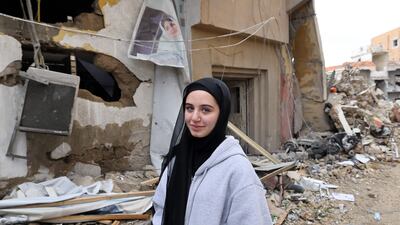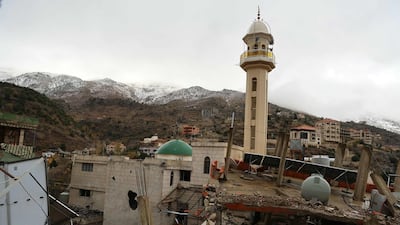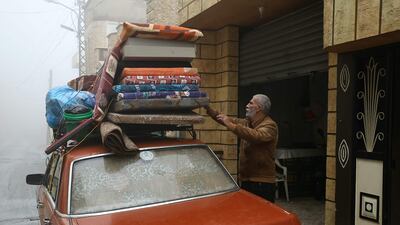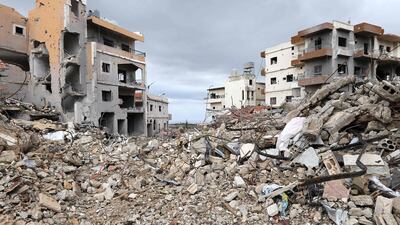One month into a ceasefire deal between Israel and Hezbollah, the cherished calm of a long-awaited truce is interrupted by the relentless buzz of Israeli drones over Beirut.
Hovering over the capital, incessant and audible, the hum of the drones is a haunting reminder for many that the war is not quite over yet.
Beirut resident
A US-brokered ceasefire agreement designed to permanently end the fighting between Israel and Hezbollah came into effect on November 27. But since then, the sounds of Beirut have been regularly drowned out by loud and visible Israeli drones manoeuvring at low-altitude.
Dalia Salah, a 28-year-old consultant who fled to Cyprus at the height of Israel’s war on Lebanon in late September, booked her flight back home as soon as she heard rumours of a potential ceasefire. “I couldn’t even wait to see if it was true or not. I just wanted to go back,” she told The National.
For the first few days, she and many others relished the sight of Beirut’s clear blue skies, void of Israeli drones or warplanes. “I could hear the birds chirping again,” Ms Salah said. “It’s a sound I will never take for granted.”
But her joy was short-lived, as only a few days into the ceasefire, the birds were once again silenced by the buzz of Israeli drones. “It’s a very uneasy feeling, that we’re always being watched by an enemy, but we’re expected to just deal with it,” said Ms Salah. “The constant reminder of it is nerve-racking.”
Sara Haidar, a 52-year-old mother-of-three, described the sound of the drones as a “mob of angry bees that won’t leave you alone”. She said the noise has at times kept her up at night, chipping away at her sleep and sanity.
Ms Haidar is a resident of Beirut’s southern suburbs and had to leave her home abruptly amid Israel’s relentless air strikes and bombs during the war. She stayed with her sister in the busy neighbourhood of Basta in central Beirut, but even the heart of the capital was not spared from Israel’s attacks.
“It’s unbearable stress,” she told The National. “We were barely starting to take a breath again after the war, but the drone was quickly back to suffocate us again.”
Ms Haidar said she has become a lot more on edge over the past few months. Any loud noise, like thunder or the slam of a door, was enough to make her jump out of her seat.
Despite the ceasefire holding thus far, the Lebanese mother said the agreement has failed to bring her any sense of security or peace of mind. “What kind of ceasefire is this that allows Israel to do whatever it wants?” she told The National. “How can we trust that such an agreement will bring us lasting peace?”
Ceasefire violations
The Israel-Hezbollah ceasefire helped bring an end to more than a year of cross-border hostilities that escalated into a full-scale devastating war in Lebanon in September. The terms of the truce are based on UN Security Resolution 1701, which brought the last war between Hezbollah and Israel to an end in 2006.
The agreement involves a 60-day window for Israeli troops to withdraw from the south, Hezbollah to move north of the Litani river and the Lebanese army to take over. A US-led committee, including UN peacekeepers and representatives of Israel, Lebanon and France has been tasked with monitoring and ensuring the ceasefire conditions are met.
Over the past month, Lebanon has accused Israel of violating the ceasefire hundreds of times. Earlier this week, Lebanese Prime Minister Najib Mikati urged the committee responsible for overseeing the ceasefire to exert pressure on Israel over its repeat violations of the truce agreement.
“We demand an end to Israeli violations and their withdrawal from Lebanese towns,” said Mr Mikati in a statement. “Lebanon is committed to the terms of the agreement, while Israel continues its violations, and this is unacceptable.”
Documented breaches of the truce include Israel’s systematic destruction of homes and infrastructure in southern Lebanon, infiltrating Lebanese towns, enforcing curfews on Lebanese territory, killing civilians and infringing on Lebanon’s sovereignty by violating its airspace. At least nine people were killed in a wave of Israeli air strikes on southern Lebanon on December 3, raising fears of an all-out war resuming less than a week after a ceasefire came into effect.
Beirut resident
On December 25, Lebanon's state media said an Israeli air strike targeted the Baalbek region in the east of the country for the first time since the truce came into effect, branding it a "violation" of the fragile ceasefire. On December 26, Israeli forces briefly detained a Lebanese citizen in the Marjayoun district in the south while he was on his way to work, before releasing him.
Security and political sources in Beirut told The National that Lebanese officials fear the potential collapse of the ceasefire agreement due to continuous Israeli violations, and that the country is once again preparing for the worst-case scenario.
“It feels like a ticking time bomb, like we never know when things will escalate again,” said Ms Haidar on the fragility of the truce. “From their drones in our skies to their tanks on our land, it’s like they’re taunting us and saying it’s not over yet.”
